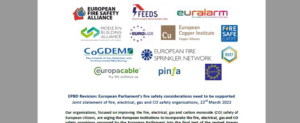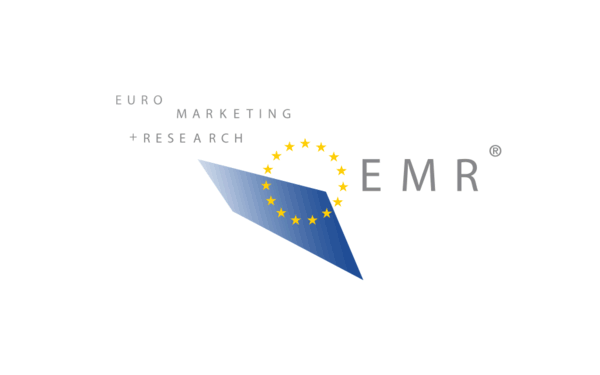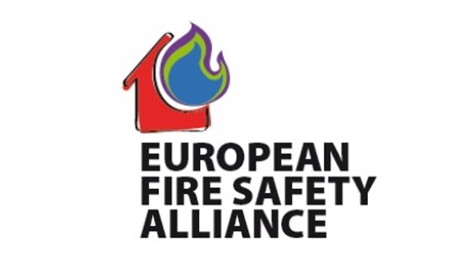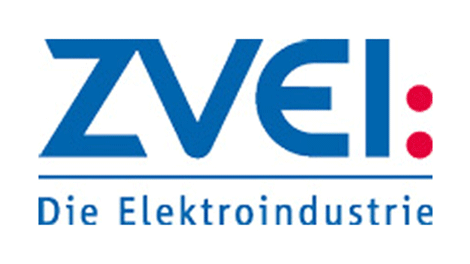European Fire Safety Alliance – EPBD revision. Joint letter supporting safety provisions.
 The European Fire Safety Alliance, together with twelve other organizations focussed on improving the safety of European citizens, has sent a joint letter calling on the European institutions to include the fire, electrical, gas and CO safety provisions proposed by the European Parliament in the final text of the revised Energy Performance of Buildings Directive (EPBD).
The European Fire Safety Alliance, together with twelve other organizations focussed on improving the safety of European citizens, has sent a joint letter calling on the European institutions to include the fire, electrical, gas and CO safety provisions proposed by the European Parliament in the final text of the revised Energy Performance of Buildings Directive (EPBD).
The revision of the EPBD is an unmissable opportunity to consider building renovation in a holistic way, with the safety of EU citizens at its heart. The European Parliament’s report recognizes the importance of fire, electrical and gas safety in the EPBD revision, by increasing energy efficiency while also improving safety and health of people, making the EU building stock more resilient and sustainable for the future.
Source
EUROPE FIRE SAFETY ALLIANCE
EMR Analysis
More information on European Fire Safety Alliance: https://www.europeanfiresafetyalliance.org/ + The European Fire Safety Alliance is a project to reduce the risk from fire in the home and is delivered by an Alliance of Professionals from within the European Fire Sector. The European Fire Safety Alliance believes the vast majority of fire deaths that occur following an accidental fire in the home are preventable. It is also true that fire discriminates in as much as it affects the most vulnerable people (particularly the elderly) in the most vulnerable areas of society.
The European Fire Safety Alliance shares national knowledge and innovations on international level. We form an independent alliance of fire professionals and prevention specialists that does not support any individual fire safety product, technology or commercial organization.
EuroFSA is an authority on fire risk, based on a strong statistical evidence base. We do research, support and encourage research, studies and reports that highlight the dangers from fire in the home and support their widespread availability. We focus on sharing knowledge and we deliver strong scientific relevant consistent messages on home fire safety.
The core group is formed by:
- Elie van Strien, former Chief Fire Officer (NL)
- Krzysztof Biskup, former Director Scientific & Research Centre for Fire Protection (PL)
- Chris Addiers, Pres. Federation of European Fire Officer Associations (BE)
- Rene Hagen, professor of Fire Safety (NL)
- Rob Baardse, Executive Director Dutch Burns Foundation (NL)
More information on René Hagen (Professor of Fire Safety, European Fire Safety Alliance): See the full profile on EMR Executive Services
More information on The European Union: https://european-union.europa.eu/index_en + The European Union’s institutional set-up is unique and its decision-making system is constantly evolving. The 7 European institutions, 7 EU bodies and over 30 decentralised agencies are spread across the EU. They work together to address the common interests of the EU and European people.
In terms of administration, there are a further 20 EU agencies and organisations which carry out specific legal functions and 4 interinstitutional services which support the institutions.
All of these establishments have specific roles – from developing EU laws and policy-making to implementing policies and working on specialist areas, such as health, medicine, transport and the environment.
There are 4 main decision-making institutions which lead the EU’s administration. These institutions collectively provide the EU with policy direction and play different roles in the law-making process:
- the European Parliament (Brussels/Strasbourg/Luxembourg)
- the European Council (Brussels)
- the Council of the European Union (Brussels/Luxembourg)
- the European Commission (Brussels/Luxembourg/Representations across the EU)
Their work is complemented by other institutions and bodies, which include:
- the Court of Justice of the European Union (Luxembourg)
- the European Central Bank (Frankfurt)
- the European Court of Auditors (Luxembourg)
The EU institutions and bodies cooperate extensively with the network of EU agencies and organisations across the European Union. The primary function of these bodies and agencies is to translate policies into realities on the ground.
Around 60,000 EU civil servants and other staff serve the 450 million Europeans (and countless others around the world).
Currently, 27 countries are part of the EU: https://european-union.europa.eu/principles-countries-history/country-profiles_en
More information on The European Commission: https://ec.europa.eu/info/index_en + The Commission helps to shape the EU’s overall strategy, proposes new EU laws and policies, monitors their implementation and manages the EU budget. It also plays a significant role in supporting international development and delivering aid.
The Commission is steered by a group of 27 Commissioners, known as ‘the college’. Together they take decisions on the Commission’s political and strategic direction.
A new college of Commissioners is appointed every 5 years.
The Commission is organised into policy departments, known as Directorates-General (DGs), which are responsible for different policy areas. DGs develop, implement and manage EU policy, law, and funding programmes. In addition, service departments deal with particular administrative issues. Executive agencies manage programmes set up by the Commission.
Principal roles in law: The Commission proposes and implements laws which are in keeping with the objectives of the EU treaties. It encourages input from business and citizens in the law-making process and ensures laws are correctly implemented, evaluated and updated when needed.
More information on Ursula von der Leyen (President, The European Commission): https://ec.europa.eu/commission/commissioners/2019-2024/president_en + https://www.linkedin.com/in/ursula-von-der-leyen/
EMR Additional Notes:
- The European Green Deal: https://ec.europa.eu/info/strategy/priorities-2019-2024/european-green-deal_en +
- The European Green Deal will transform the EU into a modern, resource-efficient and competitive economy, ensuring:
- no net emissions of greenhouse gases by 2050
- economic growth decoupled from resource use
- no person and no place left behind
- The European Green Deal provides an action plan to:
- boost the efficient use of resources by moving to a clean, circular economy
- restore biodiversity and cut pollution
- The plan outlines investments needed and financing tools available. It explains how to ensure a just and inclusive transition.
- The EU aims to be climate neutral in 2050. We proposed a EuropeanClimate Law to turn this political commitment into a legal obligation.
- The European Green Deal will transform the EU into a modern, resource-efficient and competitive economy, ensuring:
- The Revision of the Energy Performance of Buildings Directive (EPBD): https://ec.europa.eu/commission/presscorner/detail/en/QANDA_21_6686 + Buildings are one of the largest sources of energy consumption in Europe. Boosting their energy efficiency would cut emissions, tackle energy poverty, reduce people’s vulnerability to energy prices and support the economic recovery and job creation. The Renovation Wave Strategy (MEMO) presented in October 2020 set out measures aiming to at least double the annual energy renovation rate by 2030. The revision of the Energy Performance of Buildings Directive (EPBD) is an essential element of this Strategy. It upgrades the existing regulatory framework to reflect higher ambitions and more pressing needs in climate and social action while providing Member States with the flexibility needed to take into account the differences in the building stock across Europe.
- The revised directive sets out how Europe can achieve a zero-emission and fully decarbonised building stock by 2050.
- The proposed measures will increase the rate of renovation, particularly for the worst-performing buildings in each Member State.
- It will modernize the building stock, making it more resilient and accessible.
- It supports better air quality, the digitalisation of energy systems for buildings and the roll-out of infrastructure for sustainable mobility.
- Crucially, the revised directive facilitates more targeted financing to investments in the building sector, complementing other EU instruments supporting vulnerable consumers and fighting energy poverty.





